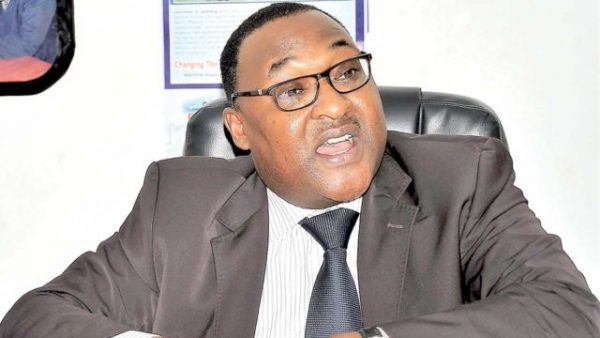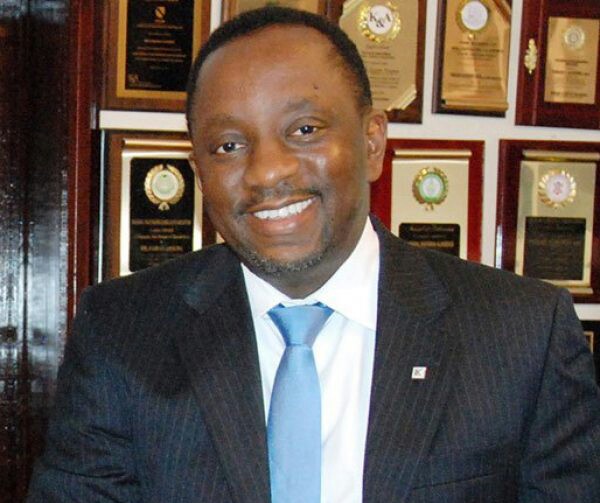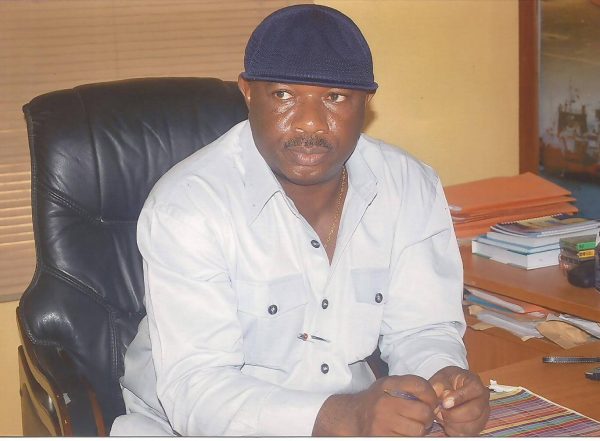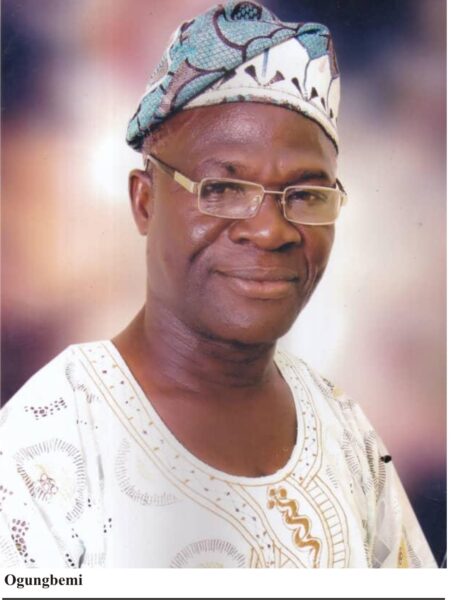How Shippers’ Council Has Fared With Port Economic Regulation – Bello

The Executive Secretary of Nigerian Shippers’ Council (NSC) Mr. Hassan Bello recently had a media parley with members of the League of Maritime Editors and Publishers (LOMEP). In this session, he gives an appraisal of the nation’s transport sector with emphasis on infrastructural developments and challenges. Excerpts
The role of Press
Editorials and comments of maritime media have become more concrete. What is happening now is that technology has enhanced the impact of online news stories and someone could read them in France or anywhere in the world immediately it is online. I receive calls from people outside the country who stress that some statements I made influence trade and business activities in those countries.
When we deliberated on the peak season surcharge it was read in France and this shows that we have to be more serious with our reportage especially if we want to be recognized across the globe. I’m really happy with what is happening because I see the media as partners but that doesn’t mean that you cannot criticize. Free press is one that asks for accountability because if we praise everybody rot will set in.
NSC Challenges
NSC has so much going against us. Funding is so low that we have to make sacrifices ourselves in order to fulfil our financial obligation. We don’t have a lucid legal framework. All we have been utilizing is a result of our creativeness and we have also fallen into a category of resistance to regulations and other regulators aren’t always open. In several instances there have been problems in the maritime industry and nobody would touch it until Shippers’ Council takes up the responsibility and begins to make some success. At that point the relevant agency would spring up and accuse NSC of trying to assume its function. At several instances I had to explain to the Minister that we intervened because they neglected the responsibilities.
We prioritize stakeholders’ engagement and I’m not aware of any other agency that engages stakeholders as much as Shippers’ Council.
Port Access Roads
On the port access roads, five years ago we conducted a study by the World Bank. If the recommendations were implemented, there wouldn’t have been any gridlock on the port access roads. The arrangement was to have an investor on Public Private Partnership (PPP) who would have invested $40million at that time. The investor was ready because he had made similar investments in other parts of the world including America, Jordan and other places. It was unfortunate that the project didn’t materialize.
Cargo Tracking Notes
We wanted to do the Cargo Tracking Notes (CTN), in fact, we even started and things were okay because we achieved general acceptability. We were mindful of the cost because we didn’t want to add to the cost of doing business. We set the fee at the lowest in Africa because we had the volumes to cover for that. Although the CTN hasn’t materialized, I’m happy to disclose that the Federal Government has approved the Shippers’ Council to work on the CTN. This isn’t going to be immediate because we are still grappling with the best way to go about it. It has gone beyond cargo tracking to an Advanced Cargo Tracking system which is based on data. It isn’t a deceit because several countries are utilizing the same platform. While NSC would be concerned about the information from CTN, the platform is an industry instrument. The data which would be provided by CTN would aid the planning for infrastructure development and revenue enhancement by curbing the fiscal leakages at the ports.
The problem of security would also be addressed with CTN which would also reduce the cost of shipping to Nigeria. There is a disparity between Apapa port and the Eastern ports in terms of the shipping cost. One container to Warri from China would cost almost twice the rate from China to Apapa because of the security. The insurance premium is also high because of the war risk insurance, so we need security issues to be addressed.
Sister Agencies
Nigerian Ports Authority (NPA) has prioritized exports as they have instructed all the terminals to facilitate exports and they have also reduced the harbor dues at the Eastern ports by 10 percent. This explains why there has been more cargo traffic to the Eastern ports in recent times than we had in the past.
Today, the National Inland Waterways Authority (NIWA) is looking like a private sector enterprise and the Nigerian Railway Corporation (NRC) has also made tremendous contributions with the evacuation of cargoes by rail. Although the rail line is being closed for the ongoing reconstructions and linking of the ports to the rail lines, it is a good development for the nation’s transport sector.
Nigerian Institute of Transport Technology (NITT) Zaria, is an institute that has been hidden over the years but they have come into limelight as they attract a huge number of people with their improved and well-articulated services. We had a meeting recently on some policies and NITT dominated the discourse because they are very young PhD holders in transport. They brought in
What we are working against is the system; otherwise we would have done better. So, please support the CEOs who are undergoing the hectic challenges to get things working. We have the infrastructure and NPA is coming up with an electronic call-up system. The roads are going to be okay and they would be a multimodal approach to cargo delivery and evacuation. It cost N1.2million at some point to move a 20ft container from Apapa to Ikeja and that is a clear distortion and very painful. The roads have been in bad shape and the traffic situation debased us. I personally feel a lot of pain and shame. I have gone to direct traffic on the port access roads. I have quarreled with so many people and other agencies over this issue.
National Transport Commission (NTC) bill
There is no politics with the National Transport Commission (NTC). It isn’t an NSC bill, but an industry bill. All the agencies came together to make suggestions on that bill and the reason the President didn’t sign was because of the reason at that time. It is similar to the Petroleum Industry Governance bill but I hope it doesn’t take as long as PIGB. The Senate has passed the NTC and the House of Representatives is expected to concur before it is taken to the President. We also have the support of the Minister of Transportation, Hon Rotimi Amaechi. He has always supported the NTC and he has written to the President to draw attention to what NSC is doing. Shippers’ Council has attained some level of fiscal stability in the sector. Nobody increases tariffs arbitrarily without consulting the Shippers’ Council. Last time we sealed a company and this brough brouhaha. We don’t even want such reports to be the news item because that should be the last step one should take. If you seal a place there would be losses and the business would be hindered.
Arbitrary Charges
Lots of issues have arisen about transfer charges and we have addressed this and written to the terminals to conform with the global best practice for the transfer of cargoes. Unless we solve the infrastructure challenge especially the road from Mile 2 to Oshodi and into Tin Can Island Port. The road is dilapidated yet it is more critical than the wharf route. The primary route to Apapa and Tin Can Island Port is the Mile 2- Oshodi expressway but the way they are going about the construction would require a very long time to be completed. Although they are being very meticulous with the process, it would have been better if they could speed up the process.
Insurance vs Container Deposits
We also have insurance coming up to mitigate the risks and eliminate the era of container deposits in the shipping industry. The shippers aren’t protected and their agents are not. If there has to be any delays in returning the containers, the risk should be insured. If there is a tendency of not meeting the deadline, insurance should be the option. We have extended the dwell time to twenty-one days and we would keep reviewing it. In some parts of the world there is no dwell time because cargoes move seamlessly.
Lekki Deep Seaport
This is what we intend to achieve at the Lekki Deep Seaport. Lagos State government, Federal Government and the private investors are working to achieve the Lekki deep seaport project. The port has also been situated at the Lekki free trade zone to support export. Access to port for export has become an issue, especially for perishable items. People can’t access the ports for over 21days and Nigerians who are industrious entrepreneurs are frustrated when the gates are shut against them as they try to export.
Maritime Journalists e-Library
We want all the dry ports in the country to be centres for export where they would be standardization and value addition. This would create more employment as more industries would be developed. Our dual mandate is to regulate the port economically and to facilitate trade. These are two important things and I have looked at the Centre for Maritime Journalism and Research and the e-library. Shippers’ Council should be at the fore-front of that because information provided by the press would enable regulators to better carry out their responsibilities.
Dry Port projects
We have been on the issue of dry ports over the years and we are excited that the Kaduna Inland Dry Port has commenced. There is a need to provide rail connection and if that is done, I suspect that the dry port wouldn’t be able to handle the volume of cargoes because everyone would want his cargo to come to Kaduna. Every year and even every quarter there is a rise in the traffic at Kaduna dry port.
Kano is spending about N1.4billion on the infrastructure to support the Dala Inland Dry Port. In fact, there is a new lease of life as the Kano State Governor paid a visit to the Shippers’ Council on the dry port. We are also meeting with the Governor of Oyo State for the Ibadan Dry Port project because we are almost at the end of the negotiations with the Chinese company which is the preferred bidder. The Ibadan dry port is a $100milion facility which could take 80,000 twenty foot equivalent (TEUs) capacity. It would bring jobs, opportunities and also be export driven. The project is by the Ibadan new rail and it is the same company that is building the rail.
Truck Transit Parks
We have also recorded a boost in this area. We would have started the Obollo-Afor truck transit park which was won by a British firm. They won the concession but they couldn’t come during the lockdown, hence there has been some adjustments in the preparations. Some people have complained that because of the COVID-19 they didn’t bid. Prior to the lockdown, we advertised and the preferred winner emerged.
At Lokoja, the consent would be given by the Governor for the land. In Abuja, the establishment of a Vehicle Transit Area (VTA) has started and this wouldn’t be for just trucks but all vehicles. The government is encouraging these projects but they have to be private sector driven. It has to be PPP driven and NSC is the economic agent trying to bring investments into the country. We have gotten $100million investment in Ibadan. In Kano, there would be Foreign Direct Investment (FDIs) and many other places.
We still intend to have a meeting with the concessionaires in Isiala Ngwa because they were the first to develop their investment. They were the most enthusiastic as they even paid the compensation themselves instead of waiting for the government. It is unfortunate that things didn’t work out as planned because of their relationship with the government. In Kaduna State, for example, before we asked they availed the land because they know the economic benefits.
FOB/ CIF Conundrum
Nigeria could be a maritime colossus but there are lots of issues including the Free On Board (FOB) and Cost Insurance and Freight (CIF) conundrum. Nigeria has spent $17trillion dollars paying freight in both crude and imported goods in the last four years. If we can’t do imported goods, we should have Nigerians carrying the nation’s crude. Among the Organization of Petroleum Exporting Countries (OPEC), only Nigeria sells her crude on FOB as others utilize CIF.
There are concerns about the risk if there is oil spillage. Nigerian shippers fear that they would be unable to cover this risk. Another issue is the budget which has already been premised on the given number of barrels and indigenous companies and Nigerians don’t have capacity. The truth is that the value of Nigerian crude is diminishing because there are emerging alternatives to crude oil. Why don’t we venture into CIF and the problem isn’t that we don’t have capacity. What we lack is the opportunity. People don’t buy ships as much as we observed in the past; they charter ships for projects. I have sold this idea to the NIMASA Director General, Dr. Bashir Jamoh and I know that he is going to push for it. I have never considered the need for legislation because I saw it as a free term entered by the country and those who buy the crude oil.
If Nigeria can keep a sizable chunk of the $17trillion taken away, you can only imagine the effect on Nigerian banks, Protection and Indemnity (P&I) clubs, developed insurance companies, Nigerian cadets participation, enhanced ship building and ship repair yards, etc. This enormous money is lost to other foreign nations because they take the money abroad. It’s not spent in Nigeria.
Recall that the crude oil fell below $0 during the COVID-19 lockdown; nobody was buying as everyone struggled to get a storage facility. The production stopped and Nigeria’s production cost is higher than many other countries.
When NNPC said they signed a long term contract, we wrote to know the charter parties but they didn’t disclose. We need to know these things and this explains the area of accountability. It is just like the concession agreement for the seaport terminals in Nigeria; why should it be hidden? The charter party agreement written by NNPC was on behalf of Nigeria, so why should it be hidden?







